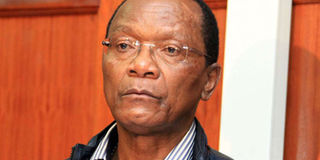Corruption goes beyond mere cash theft

NYS Director-General Richard Ndubai in court on May 29, 2018 over loss of NYS money. He is among those released on June 27, 2018. PHOTO | FILE | NATION MEDIA GROUP
What you need to know:
- The theft of such huge sums of money is an indication that tax evasion is high and the country is experiencing serious illegal financial flows.
- Corporate fraudsters have no respect for either public or private sector, and if they are not stopped, the country’s economy will collapse.
The ongoing fraud bursts at public institutions, including the National Youth Service, are a serious pointer to failure in corporate governance and professional discipline in the country.
Such monies alleged to have been lost at NYS, NCPB, and the host of reports by the Auditor-General on public institutions indicates high level impunity and system failures in the agencies.
People, both in government and the private sector, have taken advantage of the system failures to loot, illegally transfer resources from Kenya and frustrate tax collection.
It’s a complex business venture, which even contributes to terrorism in the country.
In Kenya, corruption ranges from conflict of interest, bribery to extortion (money is demanded in order to secure a particular outcome).
CASH THEFT
The multiagency team currently fighting corruption should expand to include KRA, the National Counter Terrorism Centre, the Financial Reporting Centre, the Assets Recovery Agency and Interpol.
Studies show that the biggest form of corruption in Kenya, as seen in both NYS and NCPB cases, is in asset misappropriation — largely cash theft and fraudulent disbursements including billing schemes, where payments are made to a fictitious supplier, and payroll schemes, where payments are made to fictitious employees.
The theft of such huge sums of money is an indication that tax evasion is high, money laundering rampant and the country is experiencing serious illegal financial flows.
Such points to a bandit economy and financial syndicates.
COUNTIES
The suspects arrested so far might just be pawns in a big game — the real masterminds are in the shadows.
Corporate fraudsters have no respect for either public or private sector, and if they are not stopped, the country’s economy will collapse.
And what is happening at the national level is no different from the counties, where cowboy contractors have crippled services; just see the huge amounts counties owe contractors and the poor standards of infrastructure works.
In the case of the NYS, huge amounts of public resources were allocated to an institution that has no structures, capacities and clear governance structures.
The NYS must urgently be revamped and restructured.
NYS REVAMP
It should be turned into a semi-autonomous government agency and put under the State Corporations Advisory Council through an Act of Parliament.
This will put it under a board of directors, and allow the establishment of structures and proper policies to run it as a public agency.
In its current amorphous format, expect more financial scandals.
While corruption is a global phenomenon largely associated with the government, the level of corruption within the private sector warrants serious attention, too, from investigating and prosecuting agencies.
ETHICS
With the passing of the law on the right to information, Kenyans, including the media, must demand information from companies that are doing business with the government whenever they are mentioned in corrupt deals.
The corporate world must come together and show commitment to fighting corruption and punishing those from their ilk who do corrupt business with the government.
The code for doing ethical business must be upheld. Banks must play their role in the anti-corruption fight.
Indeed, there is little evidence that many companies in the country have subscribed to the United Nations efforts, spearheaded by the UN Global Compact, in which companies are asked to join the anti-corruption drive.
Mr Victor Bwire works at the Media Council of Kenya. [email protected]




